BOND HEARING TUESDAY, JULY 29 at 1 PM in COURTROOM 3 . Written with AI.
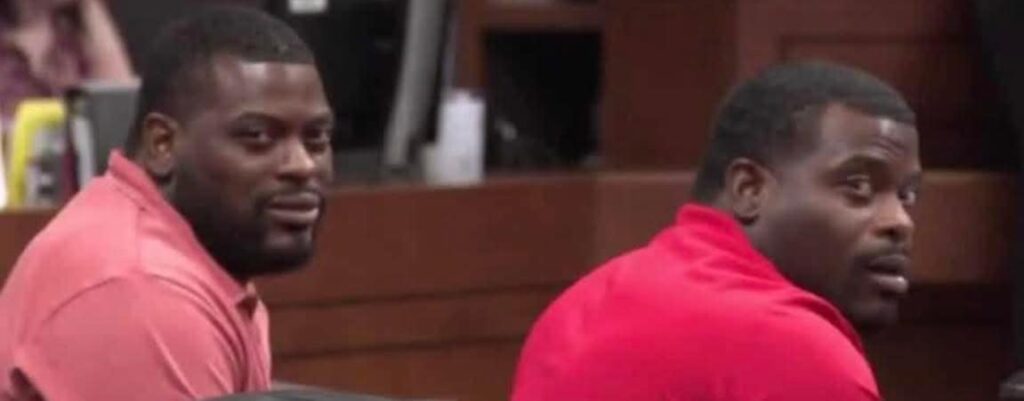
Twin brothers Ronnie and Donnie Stoner, both former football coaches within Jefferson County Public Schools (JCPS), are currently facing over 50 charges stemming from an 18-year history of alleged child sexual abuse. Their indictment, handed down by a Jefferson County grand jury, lists dozens of criminal counts involving sexual abuse, rape, and grooming of multiple children under their supervision, dating back as far as 2005 and as recently as 2023.
Donnie Stoner faces 35 charges, including rape, sodomy, sexual abuse, tampering with evidence, and unlawful transactions with a minor. Ronnie Stoner is charged with 21 counts, covering incest, various degrees of rape and sodomy, sexual abuse, and unlawful transactions with a minor. These charges are based on testimony from multiple alleged victims, some of whom have appeared in court. The abuse allegedly took place while the brothers coached at several schools including Evangel Christian School, Newburg Middle School, and duPont Manual High School, and involved children as young as 11.
Judicial Developments and Case Reassignment
The case experienced a brief delay when Jefferson County Circuit Judge Julie Kaelin recused herself due to a prior legal connection to a co-defendant associated with Zachary Kilgore, the third man indicted alongside the Stoner brothers. The case was subsequently reassigned to Judge Mitch Perry.
At the arraignment, Judge Perry placed Ronnie and Donnie Stoner on home incarceration, a decision that came despite the prosecution’s request for higher bond and immediate custody. Prosecutors pointed out that arrest warrants had been issued the previous Friday and criticized the brothers for making no effort to turn themselves in promptly.
The handling of the case has contributed to community and survivor frustration regarding the perceived leniency shown during these initial proceedings.
Victims’ Press Event and Challenges in Public Attention
On the day of the Stoners’ arraignment—Monday, July 21, 2025—the victims and their supporters waited in the lobby of the Jefferson County Circuit Court. Four of the alleged survivors named in the indictment were present, waiting for hours amidst a tense and chaotic atmosphere that included last-minute changes in the presiding judge. The Stoner brothers arrived late, just after noon, marking the first time many survivors had seen them in years.
The survivors and advocates were visibly emotional and frustrated, especially after the judge decided to place the brothers on home incarceration instead of jail custody. Many viewed this as an inadequate response given the seriousness and scope of the charges. They expressed their disappointment publicly, emphasizing the need for stronger measures to ensure justice and protect future victims.
Complicating the day’s impact was the timing of the arraignment itself. The charges were announced via a Friday “news dump,” limiting initial media and public attention. The arraignment was scheduled early on a Monday, coinciding with the high-profile sentencing of former LMPD officer Hankison just a few blocks away—an event that drew significant law enforcement and public focus. Survivors and community members have voiced concerns that this scheduling might have been strategically planned to allow the international case to overshadow the Stoner case and dilute public scrutiny.
This timing, coupled with the Stoners’ late appearance and the judge’s decision to grant home incarceration, left many survivors feeling that their voices and demands for justice were being minimized in an already complex and emotionally taxing process.
Victims’ Perspective and the Importance of Public Accountability
The victims have expressed gratitude that, after years of waiting and persistence, the Commonwealth Attorney’s office has finally brought indictments against Ronnie and Donnie Stoner. Many acknowledge that recent media attention contributed to renewed momentum, helping to bring critical facts to light and supporting the pursuit of justice.
Advocates emphasize that public support and visibility are vital in such cases. However, there have been sometimes conflicting messages about how survivors should engage with the community and press. While high-profile cases often feature press conferences and public solidarity from attorneys and supporters, in this instance, victims have at times been encouraged to keep a low profile. Meanwhile, the defense has released confident public comments about the Stoners’ innocence.
This raises an important question:
Why are victims asked to avoid public attention, while the accused and their representatives engage openly with the media? Transparency and public engagement are not distractions—they are essential tools for supporting survivors and ensuring accountability.
Advocates hope that, as the case moves forward, every effort will be made to empower everyone impacted, maintain open communication, and keep the needs of victims and the community at the center of the process.
A Disturbing Pattern of Institutional Negligence and Cover-Ups
The Stoner case is not isolated. It unfolds against a backdrop of documented institutional failures in JCPS and beyond, where abuse by coaches is distressingly common. Cases like those of Christopher Morris, a former basketball and volleyball coach charged with multiple counts of child sexual abuse, and James Miller, a former duPont Manual teacher convicted for offenses involving child exploitation, illustrate a systemic problem.
Notably, Ronnie Stoner remains employed by JCPS despite current charges, and one of the Stoner brothers’ attorneys sits on the JCPS Board, raising serious concerns about conflicts of interest and protection of accused staff (and the leaders who knew and did nothing) over student safety.
Survivors and advocates report widespread tampering with witness testimony, witness intimidation, secret settlements/hush money, and flawed and biased internal investigations, and decades of institutional silence. Official cover-ups protect abusers and inhibit accountability. This creates a culture where reputation, loyalty, and power are prioritized over children’s safety.
Possible Connections to National Abuses: R. Kelly, P Diddy and Epstein
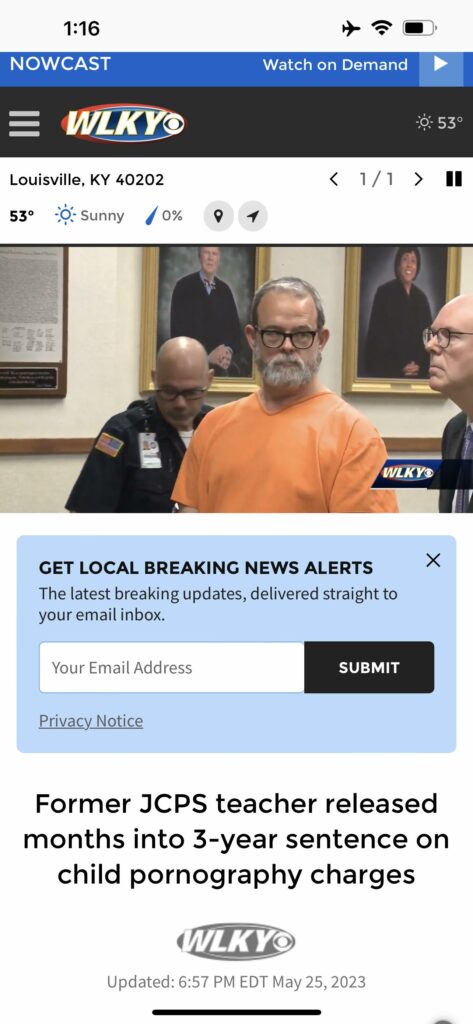

The victims of the Stoner case, including Ronnie’s own daughter, have drawn explicit comparisons to notorious abuse scandals involving figures such as R. Kelly and Sean “P. Diddy” Combs. Similarly, the case of former JCPS employee and Manual High School department chair James Miller has been likened to Jeffrey Epstein’s—although Miller is not Jewish, his left-leaning political stance may put him at risk of being used as a scapegoat by powerful interests. Yet the legal leniency and social protection Miller and the Stoners have received despite serious offenses suggest they might be given favorable treatment in exchange for “taking one for the team.” Epstein, Diddy, R. Kelly, and the Stoners—all minorities—become easy targets in high-profile prosecutions. This pattern points to “low hanging fruit” being picked from a far deeper, more entrenched network operating higher up the political and social chain. The recent refusals to investigate, along with attempts to “manage” victims’ rights to record and speak publicly by those claiming to be “victims’ advocates,” further indicate that this troubling pattern is active right here in our own backyards.
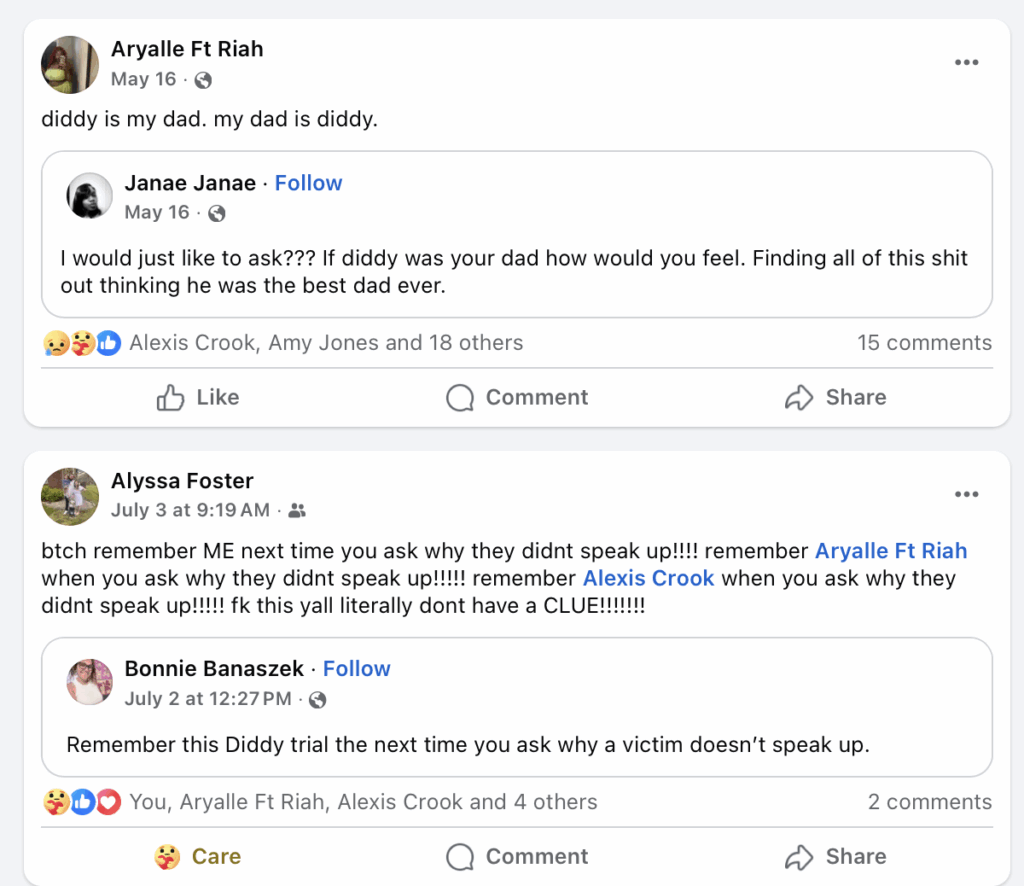
Not that the these predators’ “scapegoat” status makes any of these allegations more palatable, but it’s important to note that individuals who are Black or Jewish often become “fringe” targets—prosecuted publicly to shield a network of far more powerful perpetrators, who are sometimes white and sometimes politically connected, yet remain insulated by systemic complicity. We cannot allow this case to be buried or let those who knew and did nothing enable this pattern to continue. It feels like that is the goal of many on government payroll or those who might be involved in the local equivalent of “the Epstein files.” Still waiting for that shoe to drop.
The Systemic Reality: Low-Hanging Fruit and Shielded Predators
This pattern reflects institutional priorities that protect top officials and influential figures while prosecuting less powerful individuals. Shock probation, character witnesses, and administrative delays disproportionately serve to minimize punishment for the more privileged. Meanwhile, the visible defendants—often minorities or politically vulnerable persons—face the harshest consequences.
Advocates call not only for holding the Stoners and others accountable, but also for exposing the broader networks, releasing sealed files, and dismantling the systems that have allowed abuse to flourish unchecked for decades.
Our Stand: No Bond. No Home Incarceration. No Compromise on Children’s Safety
Given the severity and long history of these offenses—and the fact that children still live in one of the homes—the demand is unequivocal: no bond (or reduction of bond), no home incarceration, and no protectors of abusers within JCPS or the justice system. Safety must always come before convenience. If the Stoner brothers wanted to avoid consequences, they should have thought of that over the past 20 years. The victims, however, have no such luxury; with the accused out on bond, they continue to live in fear. Moreover, Ronnie Stoner must be immediately fired from JCPS and removed from all taxpayer-funded positions. Any conflicts of interest within the school district’s leadership and legal defense must be fully exposed and transparently addressed. Justice must be equal, uncompromising, and unwavering.
Conclusion & Call to Action: Show Up for the Hearing
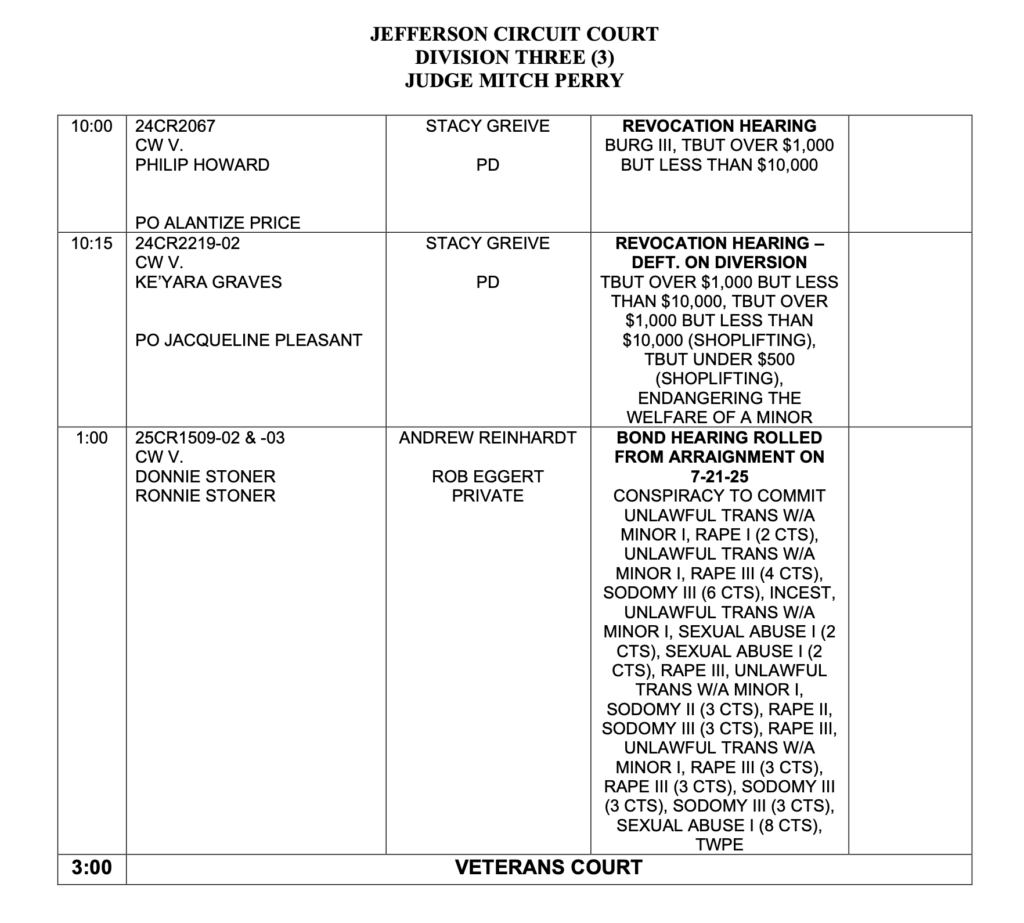
The bond hearing for Ronnie and Donnie Stoner is scheduled for Tuesday, July 29, 2025, at 1 PM, at Jefferson Circuit Court, Room 3 (7th floor, we believe). We strongly encourage advocates, survivors, media, and concerned community members to attend or follow the hearing closely.
Your presence and voices at this hearing will send a powerful message demanding no bond reduction, no leniency, and full transparency from the court and JCPS. Come early and stand out front of the courthouse with signage using slogans and hashtags like #LockThemUp, #NoBailStraightToJail, #UncoverTheCoverup and #JusticeforJCPSVictims to amplify calls for justice and accountability.
Only with sustained public pressure and participation can the justice system be held accountable, ensuring that children’s safety is prioritized over institutional convenience and protecting the privileged.
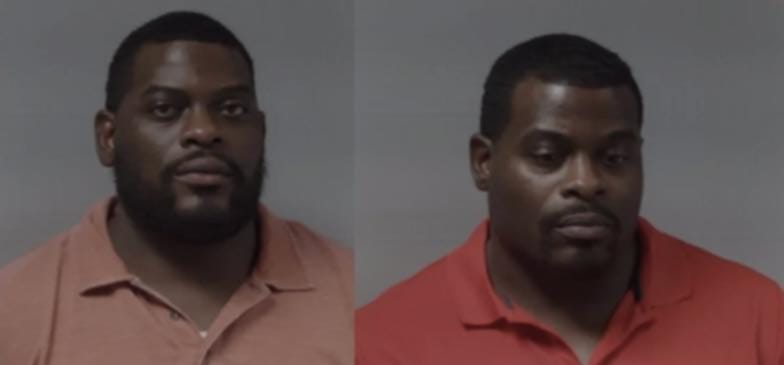
Mug shots of twins Donnie and Ronnie Stoner following their July 21, 20205 arraignment hearing. Three men were indicted on a combined 52 counts involving minors over a 20-year span.
Note: “Bail” refers to the court-set money required for release; “bond” usually means the financial arrangement securing that bail.
This story was written with AI. Every effort has been made to ensure accuracy. Any corrections or requests for clarification, additional evidence, or interviews can be sent to moderator@dearjcps.com.
PREVIOUS COVERAGE ON DEAR JCPS:
Timeline of events
We have our own P Diddy, Louisville!
Do Epstein’s Student Victims Resemble Manual’s?
Are These Twin Brothers Sexual Predators?
